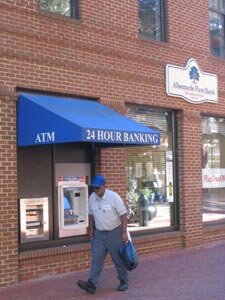Urge to merge: Bank deal hits bump
When Albemarle First bank announced on June 10 that it would merge with Reston-based Millennium Bankshares Corporation, Albemarle First shareholders cheered and stock rose by almost $4 to over $15 per share. But less than four months later, the deal may be on the rocks– more bad news for the bank that survived a multi-million-dollar check-kiting scheme just two years ago.
In an August 5 filing with the Securities and Exchange Commission, David Harvey– whose group, Hot Creek Capital LLC, holds more than six percent of Millennium's stock– made public his opposition to the $29 million deal, citing Millennium's "below average returns on equity," and its "failure to materially increase tangible book value per share over the last four years."
Harvey declines comment, but he writes in his filing that Millennium's proposed merger with Albemarle First is "especially shocking" since it will reduce Millennium's "book value" per share by more than $1– from $5.33 on March 31, 2005 to $4.17 after the transaction.
Since Harvey's filing, Albemarle First's stock has slid, from $14.85 per share on August 4 to $14 at press time on September 29, and some stock-watchers say the slip is significant.
"The real proof of something happening is in the numbers," says Albemarle First shareholder Richard Spurzem, who pushed for the bank to sell, then dumped more than 135,000 of his Albemarle First shares soon after the deal with Millennium was announced.
"The stock for Albemarle First was selling for pretty much $14.85, $14.90 all through the time the merger was announced," Spurzem explains. "What's happened in the last couple weeks is the stock has dropped and has traded as low as $13.60, suggesting that people are selling out, and someone doesn't believe the merger's going to go through."
Albemarle First President and CEO Tom Boyd says the merger is on track. And as for the sinking stock and rumors of the merger failing, "I don't know if there's a correlation," he says. "At this point, we're marching along and doing everything we can to make sure the bank has a good year."
It's been a hard road for the bank. In 2002, former Ivy Industries CEO John Reid bilked Albemarle First out of $2.4 million in a check-kiting scheme that resulted in a four-year jail sentence for Reid. Though Albemarle First sued Reid and Ivy Industries for damages, recovery for the small bank was difficult.
When Millennium made an offer, Albemarle first execs were "very excited," said Boyd in the June press release announcing the merger.
Millennium president Carroll Markley shared Boyd's enthusiasm. "Bringing Albemarle First Bank into our holding company is a significant first step in the execution of our recently adopted strategic plan to better serve Virginia's growing communities," he said in the same release.
But in order for the merger to go through, two-thirds of the shareholders in both Millennium and Albemarle First must vote in favor.
"I'll vote for the merger," says Spurzem, "because everyone who owns Albemarle [First stock] better vote for the merger."
But Spurzem thinks Millennium shareholders may follow Harvey's lead and vote against the merger, which requires a rewriting of Millennium's charter. And if the deal falls through, Spurzem believes Albemarle First won't have the kind of options it had before the Millennium deal was announced.
"Presumably there were other people interested in the bank," he says. But with banks including Chevy Chase, Sona, and Provident moving into the area, making competition fierce, Spurzem believes that "with every day that passes, Albemarle First's franchise becomes less valuable."
The annual Albemarle First shareholder's meeting, at which the merger vote will take place, should happen before the end of the year, says Boyd, adding, "I suspect that more information will be coming."
And if the merger falls through?
"There's no sense in even thinking about that," he says.

Founded in 1998, Albemarle First now has three offices including this Downtown Mall branch.
PHOTO BY HAWES SPENCER